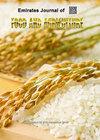评估醋酸钾对辣椒根尖的细胞毒性作用
IF 0.7
4区 农林科学
Q3 AGRONOMY
引用次数: 0
摘要
醋酸钾是一种食品添加剂,用于保存和调节加工食品的酸度(缓冲剂)。随着食品添加剂在各种食品中的不断使用,有必要对其可能的毒性进行检测。本研究的目的是通过使用薤白试验系统,测试食品添加剂醋酸钾(E261)的细胞遗传毒性作用。测试参数包括:根长、根数、有丝分裂指数和有丝分裂异常。醋酸钾的浓度分别为0.00%(对照)、0.05%、0.10%、0.15%、0.20% 和 0.25%。洋葱在不同浓度的醋酸钾中培养 72 小时。然后取根部,用压扁法将其平铺在显微载玻片上。结果表明,在 0.05% 的浓度下,受试食品添加剂对根的长度、根数和有丝分裂指数有积极影响。然而,与对照组相比,浓度越高,有丝分裂抑制作用越强,根长和根数也越少。随着食品添加剂浓度的增加,有丝分裂异常总数也在增加。观察到的有丝分裂异常现象包括染色体滞后、C-有丝分裂、多极无丝分裂、粘着无丝分裂、双核、粘着无丝分裂和微核。醋酸钾含量为 0.25%时,试验材料的影响最大。这些结果表明,这种食品添加剂具有致突变性,如果在食品中高浓度使用,会对人体造成危害。关键词:食品添加剂食品添加剂 分生组织细胞 有丝分裂指数 异常现象本文章由计算机程序翻译,如有差异,请以英文原文为准。
Evaluation of cytogenotoxic effect of potassium acetate on Allium cepa L. root tips
Potassium acetate is a food additive used for preserving and regulating acidity (buffering agent) of processed food. The continuous use of food additives in our various foodstuffs made it necessary to test their possible toxicity. This research aims to test the cytogenotoxic effects of the food additive potassium acetate (E261) by using Allium cepa test system. The parameters tested were: root length, root number, mitotic index, and mitotic abnormalities. The concentrations of potassium acetate were: 0,00% (control), 0,05%, 0,10%, 0.15%, 0,20%, and 0,25%. The onions were incubated in different concentrations of potassium acetate for 72 hours. The roots were then taken and spread on a microscopic slide by squash method. The results showed that the tested food additive had a positive effect on root length, root number, and mitotic index at 0.05%. However, it had mitodepressive effect at higher concentrations and also decreased root length and root number as compared to the control. Total mitotic abnormalities increased with increasing the food additive concentration. The different mitotic abnormalities observed were laggard chromosomes, C-mitosis, multipolar anaphase, sticky metaphase, binucleate, sticky anaphase, and micronuclei. The highest effect of the test material was observed at 0.25% potassium acetate. These results suggest that this food additive is mutagenic and can be harmful if used in high concentrations in food. Keywords: Food additive, Meristematic cells, Mitotic index, Abnormalities
求助全文
通过发布文献求助,成功后即可免费获取论文全文。
去求助
来源期刊

Emirates Journal of Food and Agriculture
AGRONOMYFOOD SCIENCE & TECHNOLOGY&nb-FOOD SCIENCE & TECHNOLOGY
CiteScore
1.80
自引率
0.00%
发文量
18
期刊介绍:
The "Emirates Journal of Food and Agriculture [EJFA]" is a unique, peer-reviewed Journal of Food and Agriculture publishing basic and applied research articles in the field of agricultural and food sciences by the College of Food and Agriculture, United Arab Emirates University, United Arab Emirates.
 求助内容:
求助内容: 应助结果提醒方式:
应助结果提醒方式:


